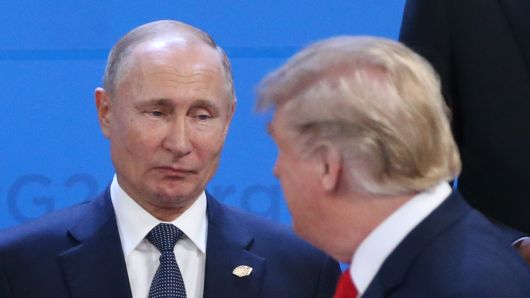Putin charms G20 leaders
December 3, 2018 | Expert Insights

Russia is putting on a brave face after U.S. President Donald Trump abruptly junked a summit with Russian President Vladimir Putin.
Trump’s snub was a clear signal to Putin just as he arrived at a G20 summit where Western leaders banded together to denounce Russia’s actions in Ukraine.
Background
The Russian Federation is the successor state to the Soviet Union. Before its dissolution, the Soviet Union and the US were the key factions in world politics. They were briefly allies during World War II but by the end of the war, they had become hostile. Mistrust between the two was one of the main reasons for the Cold War.
The end of the Cold War and the dissolution of the Soviet Union (as well as the creation of Russia) brought an end to a period of uncertainty and turmoil. Relations even improved between the two nations during the tenure of Russia's President Boris Yeltsin, but it took a significant step back under Putin.
Relations between Russia and the US deteriorated in 2014 when Russia annexed Crimea. It cited a controversial referendum for doing so. As a result, Barack Obama and his EU allies unveiled a coordinated set of sanctions against Russia and ordered it to leave Crimea. Russia responded with counter-sanctions.
In the recent past, Russia’s alleged interference in the US Presidential elections has further caused tensions in the ties. Despite Russia’s repeated denials, the US imposed harsh sanctions on Russia.
Analysis
President Vladimir Putin is attending the annual Group of 20 (G20) summit in Argentina on the back of Russia’s detainment of three Ukrainian naval vessels. The incident has sparked criticism from European leaders and has led President Trump to cancel a meeting on the sidelines of the summit.
Putin and Trump “said hi to each other,” according to the Russian leader’s spokesman — but didn’t shake hands or otherwise interchange, even during the “family photo” when leaders rub elbows as they get into place and usually exchange small talk.
Putin himself hasn’t publicly addressed Trump’s rejection but hinted at the potential fallout if the leaders of the world’s two biggest nuclear powers can’t talk to each other. Putin said in Buenos Aires that the U.S. intention to opt out of a Cold War-ear nuclear pact “creates risks of an uncontrollable arms race.”
As the summit opened, European leaders lined up to criticize what one called Russia’s “aggression” on Ukraine — the weekend seizure of Ukrainian ships and crew members near Crimea. The Group of 7 foreign ministers issued a statement demanding the seamen’s release. The standoff was the official reason that Trump cancelled his meeting with Putin, calling what’s happening in Ukraine “very bad.”
The Russian interpretation of the cancellation, however, echoed that of some of Trump’s critics at home, who noted the move came amid new challenges for Trump in the probe into Russia’s alleged role in his 2016 election campaign.
“If the domestic situation and the pressure from Russophobes like Ukraine and its sponsors prevent the U.S. president from developing normal ties with the Russian president … we will wait for another chance,” Russian Foreign Minister Sergey Lavrov said, adding “love can’t be forced.”
Isolated by Western democracies, Putin pushed instead to inject new strength into the so-called BRICS grouping of Brazil, Russia, India, China and South Africa. Putin also wants to talk to Trump about his intention to opt out of the 1987 Intermediate-Range Nuclear Forces Treaty over alleged Russian violations. Putin strongly denied any Russian breaches of the pact.
The Russian leader has warned that if the United States deploys intermediate-range missiles that are currently banned under the treaty to Europe, Russia will have to target the nations that would host them.
There was a risk that the Trump-Putin meeting could have worked out badly for both of them. After the summit with Putin in July, Trump was widely criticized for failing to publicly denounce Russia’s interference in the 2016 U.S. election and appearing to accept Putin’s denials of such activity. More anti-Russian sanctions followed, and relations soured further.
Assessment
Our assessment is that President Putin is relying heavily on BRICS states after Western sanctions have crippled the Russian economy. The detention of the Ukrainian ships has further deteriorated Russia’s standing with Europe, and we believe that despite the initial friendliness, President Trump has started to avoid meeting Putin in an attempt to save his own political standing.








Comments